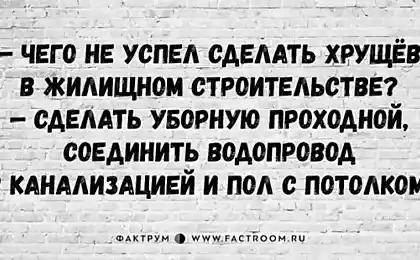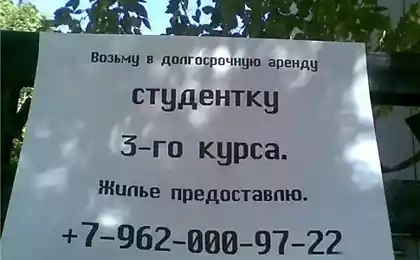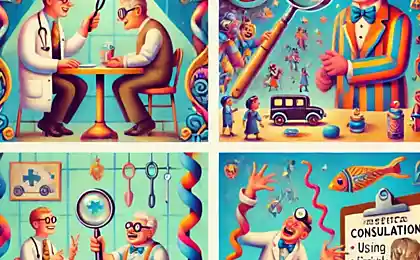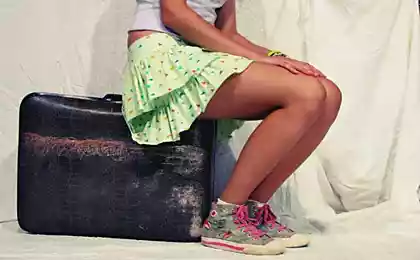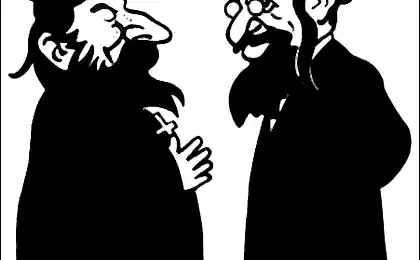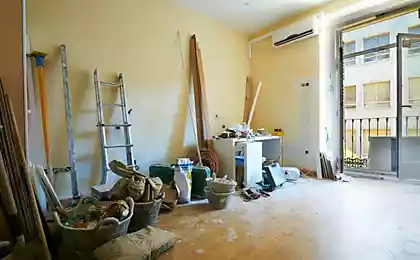856
"Housing problem"
In pre-revolutionary Russia "housing problem" does not exist!
Recently I read a newspaper article about how Moscow School children wrote an essay on "my porch." They wrote about their spat, crap entrances and stairwells, and dreamed that maybe there will be a time when in the hallways will be clean and the walls will not be obscene inscriptions, and bulbs are intact, and one boy even dared to dream about to lay in the entrance carpet. Poor kids! Dreams that will not come true. The existing system in Russia and homeownership domopolzovaniya preclude such an option. Even Mikhail Bulgakov mouth of one of his heroes noticed that Muscovites in general, good people, that's just messed up their housing problem. Note that this was said after the victory of the October Revolution. And how Muscovites lived (and residents of other cities of Russia) to win this most? And they lived quite well and with dignity.
In the 19th - early 20th century Russian citizens live mainly in private homes, public housing was not (it was social or charitable housing for the poor only). Private homes were single family - wooden or stone (for those who are richer), and apartment, the so-called "Lucrative" home. "Profitable" house was built by a private individual - a rich merchant or entrepreneur - his own money to make a profit, or "income". This house belonged to the owner of the rights of private property and apartments (or rooms) were rented. Anyone who saw on the porch of the house, or at the gate, or in a newspaper ad about the availability of the apartment, if it is satisfied with the price, could enter into a contract with the owner (or manager), often just verbal, and on the same day to move into an apartment.
And we do not need any registration, order inquiries and other papers. However, he was obliged to register with the local police department, failed to register a strictly punished. Existing laws protect tenants from the tyranny of the owner. If the tenant regularly paid the rent and did not violate the order, the landlord had no right to evict him. But if the tenant did not pay or disruptive, with the help of police quickly found himself on the street. Current defaulters and Vandals were not kept in the home to more than one month. Of course, the owner, the landlord watched (itself or through its managers and salesmen) for cleanliness and their property, ie, at home. Indeed, in a dirty, unkempt house not attract customers, the poor condition of the house to reduce the price of rental apartments and, accordingly, the income of the owner.
The order in the house and in the yard and watched even a janitor. Janitor at the time (in Russia, we have lost) was not only a cleaner area, but also perform administrative functions. He had to report to the local police station (district superintendent) all violations of the order in the house of unregistered occupants, etc. Janitor has always been inseparable from the house and lived here in the office. During the procedure should also be the local police, policemen, who constantly patrolled the area (for this they are called "hozhalye"). A night watchman was on duty constantly. Everywhere we stood still and stationary police posts - booth in which a policeman was sitting - "policeman." Therefore, in the courts and on the streets it was an order, and was quiet during the day and at night you can safely walk the streets. In the event of any incidents janitor, watchman or policeman quickly came to the rescue. In such circumstances, it is obvious hooligans, bandits and terrorists was nothing to do.
Prices for rental apartments were not high, because the owner of the hall price risk remain without tenants. Prices regulated market, supply and demand, involved in the regulation of prices and city administration, for example, the landlord has the right to raise the rent only once a year. Of course, prices varied widely - from affordable housing on the outskirts of poor quality to expensive quality apartments in the center. Price differentiation led to the fact that in the same house settled about the same income tenants, or workers, artisans, craftsmen, or the middle class - professors, bureaucrats, lawyers, or the highest - the bankers, aristocrats and senators. This improves the psychological climate in the house, helped a neighbor communication.
In homes where she lived more or less wealthy public, in the hallways and stairwells were carpets and mirrors, and rubber plants with potted palms, the doormen on duty. The lady who came to visit before the call to the apartment, could fix her hair before a mirror. It is clear that in this house, Professor Preobrazhensky could easily leave their galoshes downstairs, without fear that they will not find in the morning. And this was no exception to the rule (we now also possible to find clean entrance - one in a thousand entrances), it was a mass phenomenon. It is fair to say that among the "profitable" houses met and slums (the famous Khitrovka in Moscow or in St. Petersburg Vyazemskaya laurel, as well as the cheapest rooming house). But it was just an exception.
Extremely easy to solve the problem with moving to a new residence. You should not have to either sell or change apartment. It was enough to pay the rent for the current month, after which the contract of employment is terminated without problems, and a person could in the day to move to a new apartment. Add to this that the services in transportation of furniture were very cheap. Many chose an apartment closer to the place of work or service, theater-goers - closer to theater lovers walking in the park - close to the park, etc. Since apartment did not belong to the residents and participated in the purchase and sale, it was not about the criminalization of housing.
Sometimes several people hired apartment pool their savings, spare room can be put in the sublease. People living alone or with a low income (and it could be a family) lived in "profitable" buildings such as hotels, where there were apartments, but there were rooms that were rented. Finally, the poorest rented for a few pennies on the night of accommodation in bunk houses or "shelters" (it was the cheapest "lucrative" home). There were barracks, where for low wages the workers lived factories, barracks were built, these masters of the factories, since workers were mostly migrants from the countryside. Each person could easily find accommodation in any city in accordance with their means.
Offer of property corresponded to effective demand. In this sense, the housing problem in Russia do not exist. No one slept on the streets, it was considered vagrants and such a "tramp" was taken to the police, and then to prison. Municipal housing in pre-revolutionary Russia did not exist, but it was the so-called "Social" housing, ie, housing for the very poor. It was a house that contains the means of charitable or religious (shelters, almshouses) organizations, individual philanthropists (for example, has been widely known "home free apartments", built by merchants brothers Bakhrushina at the Sofia Embankment in Moscow. It was a gorgeous house - now it is placed the head office of "Rosneft" - and kept fully to their means).
So the townspeople lived in Russia before the revolution.
But come 1917, came the victorious October Revolution, factories, banks and shops, including residential houses were nationalized, ie, It became the property of the state. Homeowners fled abroad, who did not manage to escape - was shot or perished in the Gulag. Manage steel buildings house committees headed by Shvonder and ball, which later evolved into the current RG and disinformation. Large apartment in the center of the rich turned into communal flats, where the workers were moved from the suburbs and huts of the poor nochlezhek. Mirrors were broken, palm trees and rubber plants are broken, track stolen. Stolen and galoshes Professor Preobrazhensky. Socialism has come.
Despite all attempts to reform the socialism and still lives and thrives, particularly in the housing sector. Our homes are owned by the state and manage DEZov officials and RG. We have long understood that, where state ownership, bureaucratic, - there is no order and can not be. Try to come to DES and complain that your filthy doorways, walls spray-painted, glass broken, mailboxes set on fire, the roof leaks, the elevator does not work, etc. etc. - You best answer that is you have brought them to such a state, well, not you, so your neighbors, then the hint that you are preventing them from working. Renovated according to the program "My yard, my porch" entrances very quickly returned to its original, "true" state. And it is useless to write and complain, the official - is not the master, it all "damn." Even if they wanted to do they did not. The system must be radically changed. Socialism in a particular industry is not dead, he just pretended to be dead.
It is hoped that one day our "smart, talented and economic people" will be able to "come together, negotiate and begin to farm, build a life for themselves and others with responsibility for everything and everyone," as wrote one student. There is a probability. But it is equal to the probability that all the spectators in the theater sneeze at the same time - and then the theater will collapse. In the meantime, we enter into a staircase, closing his eyes and plugging your nose, and clutching a pocket knife or a can of nerve gas.
Before the revolution in Russia was not "Housing Problem." Each person could easily find a place to live by their means. Today we live in the housing, formed by the Bolsheviks in 1917. The Bolsheviks no more. Perhaps from time to abandon this system and start to live a normal life, a human being?
Author: SN Glazunov
Source: http: //
Recently I read a newspaper article about how Moscow School children wrote an essay on "my porch." They wrote about their spat, crap entrances and stairwells, and dreamed that maybe there will be a time when in the hallways will be clean and the walls will not be obscene inscriptions, and bulbs are intact, and one boy even dared to dream about to lay in the entrance carpet. Poor kids! Dreams that will not come true. The existing system in Russia and homeownership domopolzovaniya preclude such an option. Even Mikhail Bulgakov mouth of one of his heroes noticed that Muscovites in general, good people, that's just messed up their housing problem. Note that this was said after the victory of the October Revolution. And how Muscovites lived (and residents of other cities of Russia) to win this most? And they lived quite well and with dignity.
In the 19th - early 20th century Russian citizens live mainly in private homes, public housing was not (it was social or charitable housing for the poor only). Private homes were single family - wooden or stone (for those who are richer), and apartment, the so-called "Lucrative" home. "Profitable" house was built by a private individual - a rich merchant or entrepreneur - his own money to make a profit, or "income". This house belonged to the owner of the rights of private property and apartments (or rooms) were rented. Anyone who saw on the porch of the house, or at the gate, or in a newspaper ad about the availability of the apartment, if it is satisfied with the price, could enter into a contract with the owner (or manager), often just verbal, and on the same day to move into an apartment.
And we do not need any registration, order inquiries and other papers. However, he was obliged to register with the local police department, failed to register a strictly punished. Existing laws protect tenants from the tyranny of the owner. If the tenant regularly paid the rent and did not violate the order, the landlord had no right to evict him. But if the tenant did not pay or disruptive, with the help of police quickly found himself on the street. Current defaulters and Vandals were not kept in the home to more than one month. Of course, the owner, the landlord watched (itself or through its managers and salesmen) for cleanliness and their property, ie, at home. Indeed, in a dirty, unkempt house not attract customers, the poor condition of the house to reduce the price of rental apartments and, accordingly, the income of the owner.
The order in the house and in the yard and watched even a janitor. Janitor at the time (in Russia, we have lost) was not only a cleaner area, but also perform administrative functions. He had to report to the local police station (district superintendent) all violations of the order in the house of unregistered occupants, etc. Janitor has always been inseparable from the house and lived here in the office. During the procedure should also be the local police, policemen, who constantly patrolled the area (for this they are called "hozhalye"). A night watchman was on duty constantly. Everywhere we stood still and stationary police posts - booth in which a policeman was sitting - "policeman." Therefore, in the courts and on the streets it was an order, and was quiet during the day and at night you can safely walk the streets. In the event of any incidents janitor, watchman or policeman quickly came to the rescue. In such circumstances, it is obvious hooligans, bandits and terrorists was nothing to do.
Prices for rental apartments were not high, because the owner of the hall price risk remain without tenants. Prices regulated market, supply and demand, involved in the regulation of prices and city administration, for example, the landlord has the right to raise the rent only once a year. Of course, prices varied widely - from affordable housing on the outskirts of poor quality to expensive quality apartments in the center. Price differentiation led to the fact that in the same house settled about the same income tenants, or workers, artisans, craftsmen, or the middle class - professors, bureaucrats, lawyers, or the highest - the bankers, aristocrats and senators. This improves the psychological climate in the house, helped a neighbor communication.
In homes where she lived more or less wealthy public, in the hallways and stairwells were carpets and mirrors, and rubber plants with potted palms, the doormen on duty. The lady who came to visit before the call to the apartment, could fix her hair before a mirror. It is clear that in this house, Professor Preobrazhensky could easily leave their galoshes downstairs, without fear that they will not find in the morning. And this was no exception to the rule (we now also possible to find clean entrance - one in a thousand entrances), it was a mass phenomenon. It is fair to say that among the "profitable" houses met and slums (the famous Khitrovka in Moscow or in St. Petersburg Vyazemskaya laurel, as well as the cheapest rooming house). But it was just an exception.
Extremely easy to solve the problem with moving to a new residence. You should not have to either sell or change apartment. It was enough to pay the rent for the current month, after which the contract of employment is terminated without problems, and a person could in the day to move to a new apartment. Add to this that the services in transportation of furniture were very cheap. Many chose an apartment closer to the place of work or service, theater-goers - closer to theater lovers walking in the park - close to the park, etc. Since apartment did not belong to the residents and participated in the purchase and sale, it was not about the criminalization of housing.
Sometimes several people hired apartment pool their savings, spare room can be put in the sublease. People living alone or with a low income (and it could be a family) lived in "profitable" buildings such as hotels, where there were apartments, but there were rooms that were rented. Finally, the poorest rented for a few pennies on the night of accommodation in bunk houses or "shelters" (it was the cheapest "lucrative" home). There were barracks, where for low wages the workers lived factories, barracks were built, these masters of the factories, since workers were mostly migrants from the countryside. Each person could easily find accommodation in any city in accordance with their means.
Offer of property corresponded to effective demand. In this sense, the housing problem in Russia do not exist. No one slept on the streets, it was considered vagrants and such a "tramp" was taken to the police, and then to prison. Municipal housing in pre-revolutionary Russia did not exist, but it was the so-called "Social" housing, ie, housing for the very poor. It was a house that contains the means of charitable or religious (shelters, almshouses) organizations, individual philanthropists (for example, has been widely known "home free apartments", built by merchants brothers Bakhrushina at the Sofia Embankment in Moscow. It was a gorgeous house - now it is placed the head office of "Rosneft" - and kept fully to their means).
So the townspeople lived in Russia before the revolution.
But come 1917, came the victorious October Revolution, factories, banks and shops, including residential houses were nationalized, ie, It became the property of the state. Homeowners fled abroad, who did not manage to escape - was shot or perished in the Gulag. Manage steel buildings house committees headed by Shvonder and ball, which later evolved into the current RG and disinformation. Large apartment in the center of the rich turned into communal flats, where the workers were moved from the suburbs and huts of the poor nochlezhek. Mirrors were broken, palm trees and rubber plants are broken, track stolen. Stolen and galoshes Professor Preobrazhensky. Socialism has come.
Despite all attempts to reform the socialism and still lives and thrives, particularly in the housing sector. Our homes are owned by the state and manage DEZov officials and RG. We have long understood that, where state ownership, bureaucratic, - there is no order and can not be. Try to come to DES and complain that your filthy doorways, walls spray-painted, glass broken, mailboxes set on fire, the roof leaks, the elevator does not work, etc. etc. - You best answer that is you have brought them to such a state, well, not you, so your neighbors, then the hint that you are preventing them from working. Renovated according to the program "My yard, my porch" entrances very quickly returned to its original, "true" state. And it is useless to write and complain, the official - is not the master, it all "damn." Even if they wanted to do they did not. The system must be radically changed. Socialism in a particular industry is not dead, he just pretended to be dead.
It is hoped that one day our "smart, talented and economic people" will be able to "come together, negotiate and begin to farm, build a life for themselves and others with responsibility for everything and everyone," as wrote one student. There is a probability. But it is equal to the probability that all the spectators in the theater sneeze at the same time - and then the theater will collapse. In the meantime, we enter into a staircase, closing his eyes and plugging your nose, and clutching a pocket knife or a can of nerve gas.
Before the revolution in Russia was not "Housing Problem." Each person could easily find a place to live by their means. Today we live in the housing, formed by the Bolsheviks in 1917. The Bolsheviks no more. Perhaps from time to abandon this system and start to live a normal life, a human being?
Author: SN Glazunov
Source: http: //


